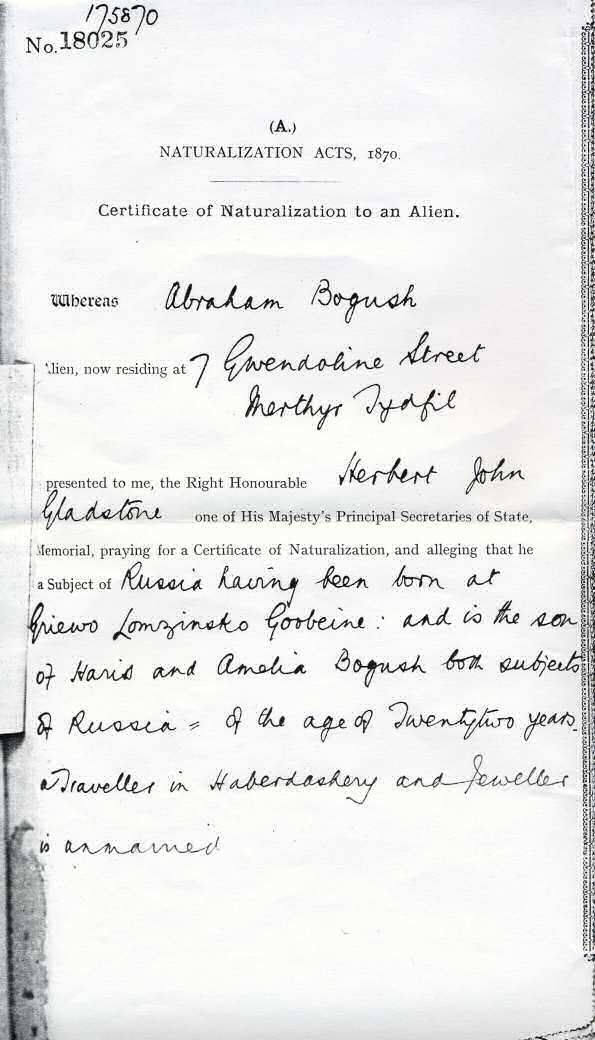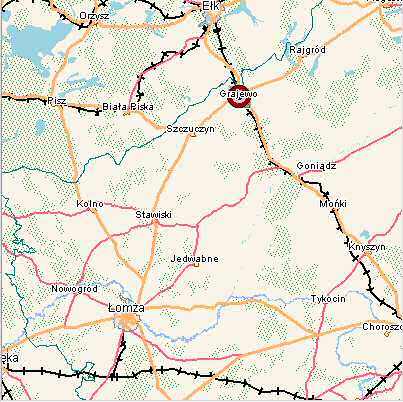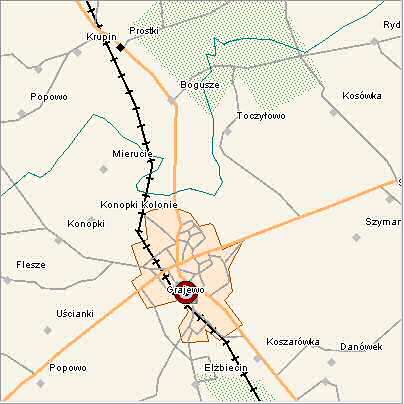
"The
first reference of the prince's village of Grajewa appeared on August 26th,
1426, when Prince Janusz 1 appointed
Bogusz as a chief officer of the village."
Where does the name Bogush come from?
What does the name Bogush mean?
There are many Bogushes listed on the internet, are we all related?
Summary
The Bogushes detailed in this web site took their surname from the village of Bogusze, a small town on the border of East Prussia and the Kingdom of Poland which was under Russian rule from 1815 to 1918. The nearest large town to Bogusze is Grajewo.
The
Bogushes who emigrated to the UK at the turn of the 20th century gave their
place of origin as Grajewo, and
were Russian subjects.
It is not known whether they lived in Bogusze itself or in Grajewo at the time
they emigrated.
Bogusz is a
given name, a form of Bogusław, and means 'Glory to
God'.
It is likely that the town of Bogusze was itself called after someone of that
name - maybe the chief officer appointed in 1426?
To understand how our family came to have the name Bogush, a short
explanation of the history of Poland is necessary.
The following is a highly condensed summary; references and web links are given
on the next page.
History of Poland
From 1772 Poland was
progressively partitioned between Austria, Prussia and Russia until it ceased to
exist as an independent state in 1795.
Poland made a brief reappearance in the guise of the Grand Duchy of Warsaw,
created by Napoleon following his defeats of Prussia (1807) and Austria (1809).
The Duchy approximated to the former Polish territory held by Austria and
Prussia (Bialystock being handed to Russia). Following Napoleon's defeat in
1815, the Congress of Vienna divided the Duchy into three parts between Prussia,
Russia and the independent state of Krakow (although that later became part of
Austria.) The Russian ruled territory was known variously as the Kingdom of
Poland, Congress Poland and Russian Poland.
The Kingdom of Poland was subdivided into 8 voivodeships or provinces until 1844 when it was reorganised into 5 gubernias (a Russian word, also meaning provinces). In 1867 there was further reorganisation into 10 gubernias which, save for some reallocation of districts, remained until Poland re-emerged as a sovereign nation in 1918.
Following the anti-Russian uprising
of 1863, use of the Russian language was mandated for official documents
in 1867 resulting in all proper names being transliterated into Cyrillic script,
again until 1918 when Polish became the official language.
Surname adoption by Jews in the Kingdom of Poland
In 1821 adoption of family names was
made compulsory; use of place names or other common nouns being recommended.
Adult sons were to take the same name as their fathers, and surnames already
used by non-Jewish Poles were to be avoided.
Each family within a district was to take a different surname.
In the southern Augustów
voivodeship which included Bogusze in 1821, approximately 30% of adopted names
were place names.
Alexander Beider's Dictionary of Jewish Surnames from the Kingdom of Poland
(pub Avotaynu 1996) identifies the surname Bogusz
as being named after the village of Bogusze.
From 1823 until 1825 anyone who had
not yet assumed a family name had one imposed by the authorities.
For a period, Jews were required to carry their certificates of surname adoption
with them, and use of a name other than that certified was punishable.
It must be noted that Polish Jews of the period generally spoke no Polish, were
illiterate and had no interest in their newly gained family name and continued
to use their patronymic Hebrew, Yiddish and diminutive or pet names depending on
the circumstances.
What does the name 'Bogush' mean?
The word Bogush admits to several translations. As a Russian given name it means to 'serve or obey', in Polish, the 'Bog' prefix means God; 'Bogaty' means rich.
However, we can now be sure that the Bogushes detailed in this web site are named from the village Bogusze which is called after the given name Bogusz a version of Boguslaw, which translates as 'Glory to God'. So, if your surname is Bogush, the most appropriate translation is 'Glory to God'.
Bogush or Bogusz?
The English 'sh' sound is
represented by 'sz' in Polish, so in the 1820s when the names was first adopted
by Polish Jews, the name would have been spelled 'Bogusz'. However from 1867,
names had to be written in Cyrillic in which the 'sh' sound is represented by
the character ш.
Bogushes who emigrated to non-Cyrillic writing countries before 1918 would have
had their Cyrillic names back-transliterated to Bogush.
Are all Bogushes related?
No. If you have Jewish Bogush ancestors then you are (almost!) definitely related to the Bogushes listed in this web site who took their surname in 1821 from the place called Bogusze. If you are called Bogush but have no Jewish ancestry, then your surname is still based on the given name Bogusz (a form of Boguslaw) but most likely derived directly from the given name, not via the place name. (ref Beider)
Roland Bogush
March 2006
Part of the Naturalization Certificate of Abraham Bogush

Modern maps showing relative locations of City of Lomza, Grajewo and Bogusze:

